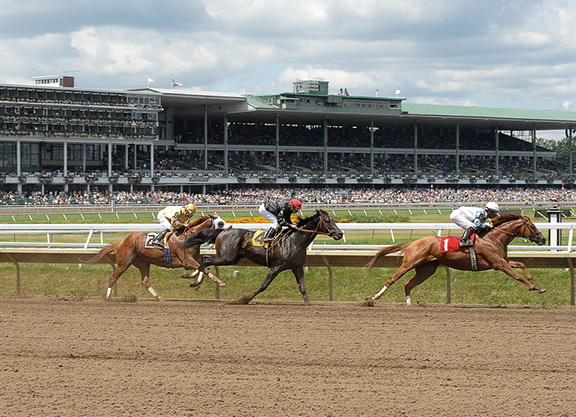By T. D. Thornton
A state audit of the New Jersey Racing Commission (NJRC) that sampled the records of 100 individuals listed as never having paid their fines for racing infractions has revealed that at least $272,000 remains uncollected, with 76% of that money being outstanding for penalties that were imposed by the NJRC as long as two decades ago.
The Office of the State Auditor, which probed various aspects of the commission for the period between July 2016 through March 2020, also stated that the commission-produced equine fatality reports “are not always complete and the timeliness of the submission of reports cannot be determined.”
Although the audit stated that the commissions finances were generally properly processed and recorded in the state's accounting systems, there were concerns over some missing cash receipts for certain licensing and fingerprinting transactions at the commission's offices at Monmouth Park, Meadowlands Racetrack, and Freehold Raceway.
John Brennan of njonlinegambling.com first reported on the audit, a copy of which can be accessed here.
“We judgmentally selected 100 of 138 licensed individuals with outstanding fines over 90 days from the NJRC List of Fines Not Collected report for the period March 13, 2000 through August 30, 2019,” the audit stated. “The individuals listed in the report did not pay their fines within the required 48 hours. We reviewed the NJRC system to verify if these individuals were suspended and placed on the security guide and noted the commission did not suspend the licenses of 18 individuals.
“In addition, for the same sample of 100 individuals, we noted 91 rulings with fines totaling $272,000 are still outstanding, of which 69 rulings totaling $215,725 range from 10 to 19 years old. If an agency is unable to collect debt within 90 days, the account should be transferred to the Department of Treasury, Division of Revenue and Enterprise Services for further collection efforts….The lack of the commission's enforcement of controls with regards to suspensions increases the risk that suspended individuals could participate in horse racing activities.”
The NJRC was allowed to attach a written response to the state audit. The commission disputed some of the audit's findings on the unpaid fines and lack of suspensions.
“We have reviewed the 18 licensees in question and found that only one licensee received a license to race in New Jersey after failing to pay a fine,” the NJRC stated. “That license was issued in 2009, and has not been renewed since then. All of the licensees who are neither deceased nor out of business, have been placed on the NJRC Security Guide. Individuals placed on the Security Guide do not obtain licensure for as long as their fines remain unpaid.
“It is important to note that the NJRC has a backup procedure in place intended to ensure that persons who do not pay fines do not race. When an individual with an outstanding fine comes in to be licensed, even if they are not on the Security Guide, the billing screen will show the outstanding, unpaid balance in red. The NJRC licensing inspectors are trained to refuse to issue a license until the fine is paid.”
With regard to the equine fatality reporting, the audit cited a lack of required tattoo numbers for some deceased horses and the omission of other required identifying information as mistakes that needed to be corrected moving forward.
“We reviewed the equine fatality reports from calendar year 2014 through calendar year 2018 to determine if the reports were complete,” the audit stated. “Eighteen of the 111 reports (16%) reviewed were submitted without the tattoo number. Thirty-four of the 111 reports (31%) were submitted with inadequate information regarding the carcass removal. Six of the 111 reports (5%) were missing the necessary signature of either the trainer, custodian, or veterinarian. Eight of the 111 reports (7%) were submitted without the owner or trainer's name being listed.
“In addition, we could not determine the timeliness of the submission of any of the reports to the commission because the reports were not date-stamped when received,” the audit summed up.
The NJRC responded that it has already proposed a series of amendments to the New Jersey Administrative Code that would improve the fatality reporting. Those amendments were proposed back in December 2019, the NJRC stated. But the commission's response didn't address why it's taken nearly 1 ½ years to get those better reporting guidelines on the books.
The NJRC is supposed to consist of nine members appointed by the governor, but there continue to be five vacancies on the commission in the governor's fourth year in office.
The commissioners are Pamela Clyne (chair), Michael Arnone, Francis Keegan, and Glen Vetrano. Judith Nason is the executive director in charge of daily operations.
Not a subscriber? Click here to sign up for the daily PDF or alerts.






